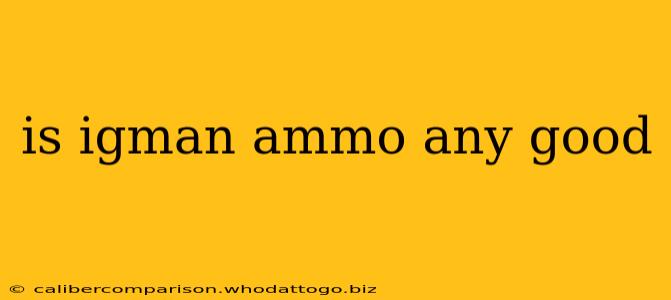Is Igman Ammo Any Good? A Comprehensive Review
Igman ammunition, produced by the Igman Konjic factory in Bosnia and Herzegovina, has gained a notable presence in the global firearms market. But is it any good? The answer, like most things in the world of ammunition, isn't a simple yes or no. This in-depth review will explore Igman's strengths, weaknesses, and overall value proposition, helping you determine if it's the right choice for your needs.
Igman Ammunition: A Closer Look at the Manufacturer
Igman Konjic boasts a long history in ammunition manufacturing, dating back to the early 20th century. This legacy provides a certain level of comfort for some shooters, suggesting experience and established manufacturing processes. However, it's crucial to remember that history alone doesn't guarantee consistent quality. The factory has undergone periods of modernization and technological upgrades, but understanding their current production capabilities is key to evaluating their ammunition.
Quality and Consistency: What Shooters Are Saying
Reviews of Igman ammo are often mixed. While many shooters report satisfactory performance at the range, consistent reports of variations in accuracy and reliability are prevalent. Some users experience flawless function, while others encounter issues with misfires or inconsistent bullet velocities. These inconsistencies may stem from a variety of factors, including variations in raw materials, manufacturing tolerances, and quality control.
It's important to note that these inconsistencies don't necessarily indicate inherently bad ammunition. Many budget-friendly brands experience similar issues. The key takeaway is to manage expectations. If you're seeking match-grade precision, Igman likely isn't the ideal choice. However, for plinking, practice, or less demanding applications, it can provide acceptable performance for its price point.
Types of Ammunition Offered and Their Performance
Igman offers a range of calibers and ammunition types, including:
- Pistol Ammunition: Common calibers like 9mm Luger, .45 ACP, and .380 ACP are readily available. Performance in these calibers often aligns with the general observations mentioned above – generally functional, but with potential for variations in accuracy and reliability.
- Rifle Ammunition: Igman produces rifle ammunition in various calibers, including popular choices like 7.62x39mm and 5.56x45mm NATO. Similar to their pistol ammo, reliability and accuracy can be variable.
- Shotguns: Igman also offers shotgun ammunition, although this segment is less frequently reviewed and discussed online.
Price and Value: Is Igman a Budget-Friendly Option?
One of Igman's most significant selling points is its price. It often represents a budget-friendly alternative to more established brands. This affordability makes it appealing to those on a tighter budget or those who need large quantities of ammunition for practice. However, the trade-off is often the aforementioned variability in performance.
Conclusion: Weighing the Pros and Cons
Pros:
- Affordable Price: Igman ammo is generally less expensive than many competitors.
- Wide Caliber Selection: They offer a range of calibers to suit various firearms.
- Readily Available: Igman ammunition is widely distributed, making it easy to find.
Cons:
- Inconsistent Quality: Reports of variations in accuracy and reliability are common.
- Not Match-Grade: Not suitable for applications requiring high precision.
- Potential for Misfires: While uncommon, misfires have been reported by some users.
Ultimately, whether Igman ammunition is "any good" depends on your individual needs and expectations. If you prioritize affordability and are willing to accept some level of variability in performance, it might be a suitable option for casual shooting and practice. However, for critical applications where reliability and precision are paramount, it's advisable to opt for a higher-quality, more consistently performing brand. Always prioritize safety and remember to thoroughly inspect your ammunition before use.

